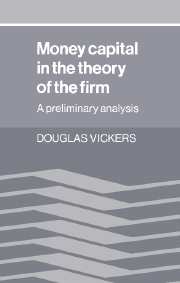Book contents
- Frontmatter
- Contents
- Preface
- PART I Theoretical issues and analytic motivation
- PART II The neoclassical tradition
- 4 Production, pricing, investment, and financing interdependence in the firm
- 5 Probability, risk, and economic decisions
- 6 Utility, uncertainty, and the theory of choice
- 7 Financial asset markets and the cost of money capital
- 8 The cost of money capital: further analysis and controversy
- 9 The investment expenditure project
- PART III Postclassical perspectives
- References
- Index
6 - Utility, uncertainty, and the theory of choice
Published online by Cambridge University Press: 18 September 2009
- Frontmatter
- Contents
- Preface
- PART I Theoretical issues and analytic motivation
- PART II The neoclassical tradition
- 4 Production, pricing, investment, and financing interdependence in the firm
- 5 Probability, risk, and economic decisions
- 6 Utility, uncertainty, and the theory of choice
- 7 Financial asset markets and the cost of money capital
- 8 The cost of money capital: further analysis and controversy
- 9 The investment expenditure project
- PART III Postclassical perspectives
- References
- Index
Summary
The objective of economic theory, it is frequently suggested, should be that of explaining “human behaviour as a relationship between ends and scarce means which have alternative uses” (Robbins, 1935, p. 16). In this conception of things, the problem of allocation comes sharply into prominence. It has led to the view that economic theory is concerned essentially with the logic of choice. Difficulties inhere in the constriction of economics to such a narrow focus, but it has given rise to extensive investigations into the criteria of choice or action.
Classically, the criterion on the production side of the economy has been that of profit maximization or, as we have seen, the maximization of economic value. On the consumption side, the criterion has generally been the maximization of utility or satisfaction, and a considerable body of theory has developed around the notion of the consumer's utility function. This provides a linkage with our present analysis, pointing to the possibility that decision makers' utility functions may be defined, not only over assumedly known conditions or entities, but over variables whose values can be specified only probabilistically. We raise, therefore, the possibility of what we refer to as the theory of stochastic utility, or of utility functions defined over stochastic arguments. In this chapter we shall examine a number of basic and related propositions that project analogies onto the theory of the firm.
- Type
- Chapter
- Information
- Money Capital in the Theory of the FirmA Preliminary Analysis, pp. 108 - 132Publisher: Cambridge University PressPrint publication year: 1987



